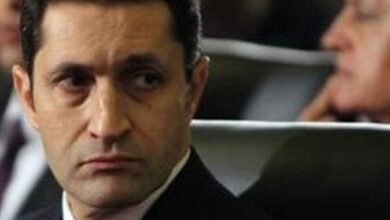You know it's a revolution when the same protesters, who two years ago timidly protested in front of state security premises for three minutes to demand the release of a prisoner, freely promenade through its offices and search through its files.
Al-Shorouk, a privately-owned paper, hails this revolutionary moment with the headline, “The fall of the state security empire. Thousands of citizens walk through secret torture rooms.” The lead of the story reads “after decades of grooming fear into millions of people, state security is having its own moment of fear.” The story moves on to report that in some places where state security premises were stormed, police responded by using violence against protesters.
A more conservative take on the events is manifested in former regime mouthpieces such as the state-run Al-Ahram and Al-Akhbar. Al-Ahram runs a headline that reads, “Fire inside state security.” In the story we read, “In light of serious accusations that there is a deliberate conspiracy to burn documents, a security source said an urgent study is being undertaken on how to restructure the apparatus and define its functions.” The story acknowledges protesters’ actions around different state security premises throughout the country, as well as skirmishes that injured both policemen and civilians. An additional side bar box placed oddly underneath the main story reads, “When protesters stormed the state security premises in Nasr City, they headed towards secret corridors to look for prisoners inside cells, but found none.”
For Al-Akhbar, the story is less important, occupying only the second half of its front page. Its lead reads, “State security premises in Alexandria, Cairo, Giza and 6 October witnessed angry protests that turned into fire and chaos.” The story said that most protesters hailed from the Muslim Brotherhood and Salafi groups, who had violent encounters with the state security.
Party paper Al-Wafd’s editor, Ossama Heikal, writes in his editorial that following these events and the appointment of Essam Sharaf as prime minister, priority must be given restructuring the security apparatus, particularly state security. Heikal suggests state security has become an information gathering apparatus that does not deal with people directly.
The old regime’s court cases were featured as a reporting priority in state-run papers, whose access to sources close to the state facilitates coverage. Al-Akbar reports that the hearing for the assets case against toppled President Hosni Mubarak and his family is postponed until Tuesday. The paper also reports that no family members will be present at the hearing, which will look into preventing the Mubaraks from accessing their assets. The Mubarak hearing is contrasted with that of Habib al-Adly, former Interior Minister, who is accused of money laundry and corruption charges.
Al-Akhbar has been running detailed stories about how detained former ministers are treated in prison. The paper says that al-Adly hid his face with a cap to avoid eye contact focuses on the details of al-Adly’s arrival at court, reporting that he wore a white suit and a cap. It also reports that policemen formed a human shield around al-Adly’s cage to separate him from the crowds attending the trial. In fact, no photo of the minister during his court hearing could be spotted in any of today’s papers.
Privately-owned Al-Dostour contains more detailed coverage of both court hearings. In Mubarak’s hearing, Al-Dostour reports on the legal representation of the former ruling family, revealing that Bahaa Eddin Abu Shaqa declined a request from Mubarak himself to be his lawyer. Mubarak had asked Abu Shaqa to represent him in an appeal against the public prosecutor’s decision to freeze his family’s assets. Al-Dostour also quotes Mohamed Hamouda, another lawyer, who was also called by a member of Mubarak’s family two days before Saturday’s hearing to ask him to represent them. Hamouda said that he declined the request. He said that while the people have the right to hold their former rulers accountable for their sources of wealth and punish them if corruption is proven, he cannot do legal work amid such chaos, speedy trials, and what he calls “inspection tribunals.”
Al-Wafd prioritizes Mubarak’s search for a lawyer with a headline that reads “Mubarak looks for a lawyer.” It details Abu Shaqa and Hamouda’s refusals to represent the former president in court.
Across diverging editorial policies, today’s papers reveal many images of how an empire is falling apart.
Egypt's papers:
Al-Ahram: Daily, state-run, largest distribution in Egypt
Al-Akhbar: Daily, state-run, second to Al-Ahram in institutional size
Al-Gomhorriya: Daily, state-run
Rose al-Youssef: Daily, state-run, close to the National Democratic Party's Policies Secretariat
Al-Dostour: Daily, privately owned
Al-Shorouk: Daily, privately owned
Al-Wafd: Daily, published by the liberal Wafd Party
Al-Arabi: Weekly, published by the Arab Nasserist party
Youm7: Weekly, privately owned
Sawt al-Umma: Weekly, privately owned




